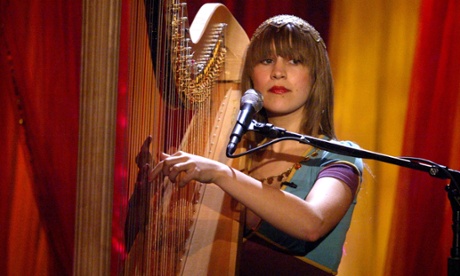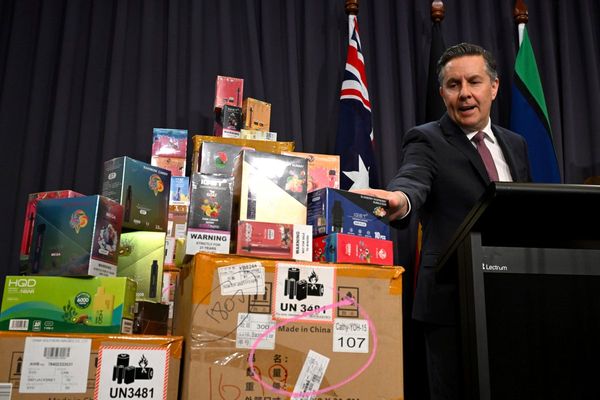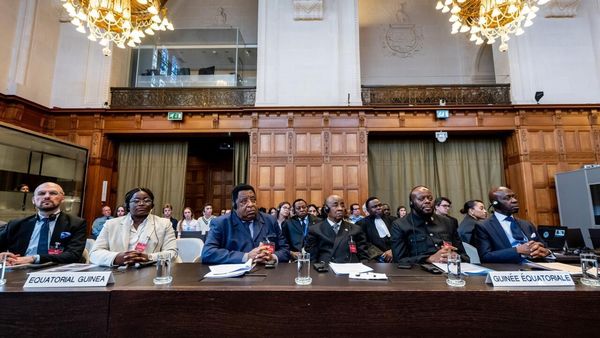
The response in the bar afterwards is split clearly along gender lines. Robert and his male friend are in raptures. What a voice! Such fragile beauty, such mesmeric phrasing, such idiosyncratic delight! (We’re paraphrasing here, you understand – you can read a lot into “yeah, it was alright”, you know.)
Susie and her female friend are seething. What a voice! Such ickle-wickle pretension, such cloying irritation, such an obvious thing for a dumb male to fall for! (No paraphrasing needed here – they were sharpening knives …)
The voice is certainly the key to understanding Joanna Newsom, handmaiden of the harp, otherworldly warbler to the chardonnay-supping classes, this season’s symbol of good taste and fine grace. She sounds like (brace yourself, metaphor fans): a small child singing to herself at the bottom of a well; a fully grown woman lost in the world, senses sharpened by being so far on the outside, always squinting to get a glimpse of what’s happening in real life; like a mad thing wandering home down the middle of the street, sticking her tongue out at passers by, laughing, laughing.
There’s actually a technical term for all this, of course: Björk. And therein lies the rub. While Ms Gudmundsdóttir sounds like she does because she comes from a rock in the middle of the north Atlantic populated by wilfully individualistic Scandinavians (a sublime combination of nature and nurture, you could say), Joanna Newsom doesn’t have a natural, physical reason for sounding like an unhinged child of nature. She doesn’t even hail from some brick-chewing county in the deep south – San Francisco’s Bay Area, actually. All of which makes you wonder … do the girls have a point?
If this is cynical theatre, it’s brilliantly done. Newsom doesn’t play up any ickle-wickle mannerisms to match the sheer oddity of her voice – in fact, she seems serious with nerves, her face only cracking as she tries to contain herself each time the audience roar with delight at the end of each song. And the setting is subtly magical – a black backdrop, a simple black dress, and a huge golden harp, almost dwarfing the artist. Faced with such an unshowy focus, it’s easy to jettison your sense of disbelief and let yourself go with the flow. Those suspicions can take a rest for a moment.
Best of all, she plays the harp like a banjo. If this was all swaths of fairy dust, sweeping strings and twee mystery, pouring bags of Tate & Lyle on those curious tonsils, then it would be too much to take. But Bridges and Balloons casts us deep in to Appalachian, O Brother, Where Art Thou? territory, all cicada atmosphere and offhand poetry – which is no mean feat for a song that starts off with the couplet “We sailed away on a winter’s day / With fate as malleable as clay” and goes on to match The Owl and the Pussycat for poignant seafaring nonsense.
It’ll take a while to decode exactly what Newsom’s singing about, but that’s part of her appeal at the moment. You can’t have a sense of wonder without, well, something to wonder about. It’s telling, though, that the song that’s received most passionately is also the most straightforward, a quietly chilling tune about war (“sent away to die in perfect form”) and its aftermath (“those who have returned have not returned”). The applause goes on and on.
It’s what happens now, what happens after the argument has moved from the bar and on to the street and back home and beyond, that’s truly interesting. If we learn to assimilate Newsom’s voice and eccentricities, come to accept them and almost not hear them, as we do with Björk, then we have another major new talent on our hands. But if something sticks in the craw, trips us up about it all, then she’ll just be another fleeting novelty. We’re good at those in the UK, after all. My money’s on the former. Such uncommon magnificence. What a voice!
© Ian Watson, 2004







